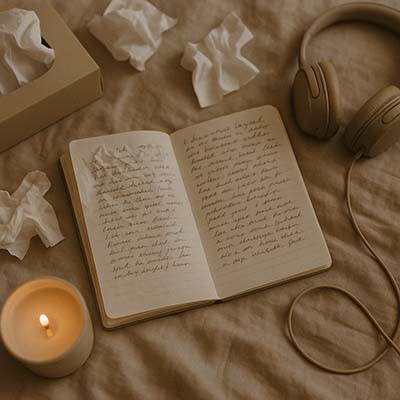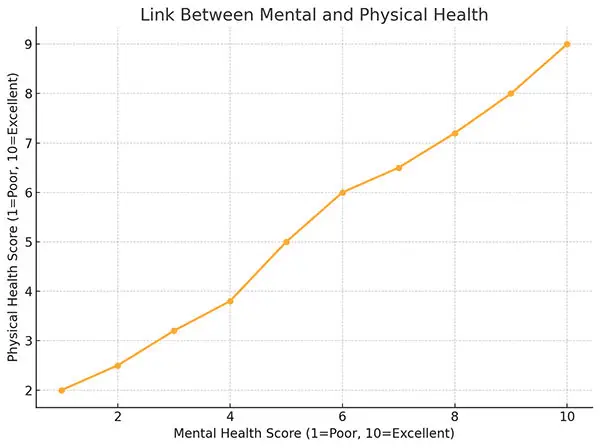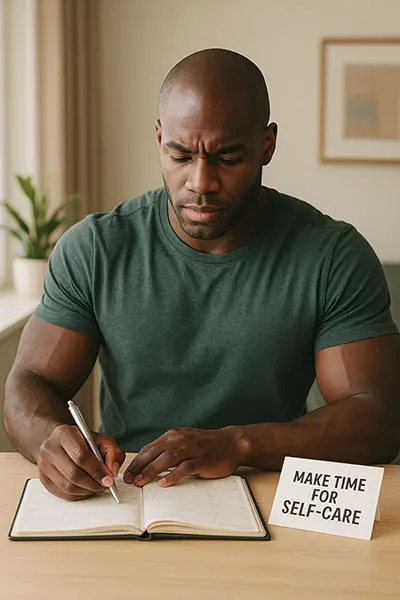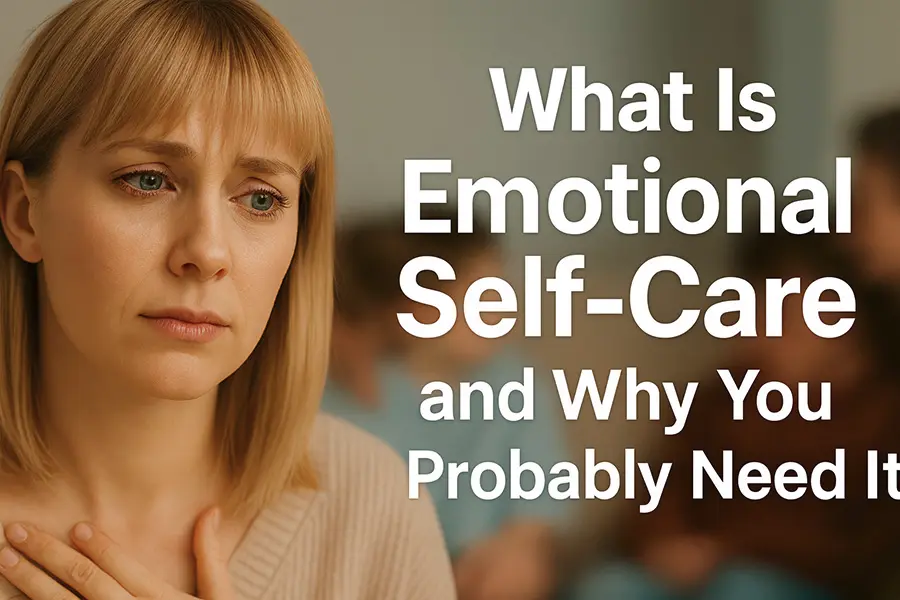Feeling overwhelmed for no clear reason? Emotional self-care might be what you’ve been ignoring. This brutally honest, kinda messy deep-dive shares what emotional maintenance really looks like beyond Pinterest quotes and cute journals.
Table of Contents
- Introduction
- What Is Emotional Self-Care?
- Why You Probably Need It
- How to Practice Emotional Self-Care
- Overcoming Common Obstacles
- Emotional Self-Care for the LGBTQ+ Community
- The Science Behind It
- Conclusion
- FAQ
- How to Start Emotional Self-Care
- Final Thought
Introduction
Ever been standing in line at the pharmacy, just trying to grab some shampoo, and out of nowhere, you’re hit with this weird wave of anxiety? Your heart’s racing, your palms are sweaty, and your brain’s going a million miles an hour for no clear reason. That was me a few months back, and let me tell ya, it was not fun. I looked around, everything seemed normal, but I felt like I was drowning in my own head. 😓
What was going on? I had a decent job, a cozy apartment, and no major drama in my life. So why was I freaking out over something as simple as buying shampoo? That’s when I realized I’d been ignoring something super important: emotional self-care.
You’ve probably heard about self-care bubble baths, face masks, maybe a fancy coffee run. But emotional self-care? That’s a whole different beast. It’s not always cute or Instagrammable, but it’s what keeps you grounded when life gets messy. In this article, we’re gonna dive into what emotional self-care really is, why you probably need it more than you think, and how to make it part of your life without feeling like it’s another chore. No Pinterest quotes, just real talk from someone who’s been there

It Hit Me in the Weirdest Way
I was standing in line at a pharmacy, waiting to buy shampoo, and I felt like crying. Not the soft, cinematic kind of cry either the ugly, tight-throat kind. Nothing had happened, really. Just… everything.
Mental Self-Care: A Beginner-Friendly Guide
The pharmacist asked if I wanted a paper or plastic bag and I said “Yes.” I don’t even know what that means. He looked at me like… “??” and I gave this weird laugh and left.
I sat in my car, keys still in my hand, and just stared. That kind of stare where your brain’s still buffering.
Later that night, it hit me: I hadn’t checked in with myself emotionally in… I don’t even know how long. Maybe since my last real breakdown.
What Is Emotional Self-Care?
So, what’s emotional self-care all about? At its core, it’s about tuning into your feelings, understanding what’s going on inside, and taking steps to manage those emotions in a healthy way. It’s not just about feeling happy all the time that’s not realistic. It’s about accepting all your emotions, even the messy ones, and giving yourself the tools to deal with them.
According to the National Institute of Mental Health, self-care, including the emotional kind, is about doing things that help you live well and boost both your mental and physical health. Emotional self-care specifically means recognizing what you’re feeling, processing it, and protecting your emotional energy.
Think of it like this: your emotions are like a garden. If you ignore them, weeds start growing, and things get out of control. But if you tend to them pull a few weeds, water the good stuff you end up with a healthier, happier garden. Here’s what emotional self-care might look like:

- Writing in a journal to sort out your thoughts.
- Talking to a friend or therapist about what’s on your mind.
- Saying “no” to stuff that drains you.
- Taking a few minutes to breathe deeply and check in with yourself.
- Doing something you love, like painting or listening to music, to lift your spirits.
It’s not one-size-fits-all. What works for me might not work for you, and that’s okay. The key is finding what helps you feel balanced and calm on the inside
It’s not journaling (though sometimes it helps), not meditating on a pillow with candles (unless that works for you). It’s not crying into your soup okay maybe it is, occasionally.
Emotional self-care is noticing your feelings before they turn into explosions. Asking yourself, “Am I okay?” and actually waiting for the answer.
Calling a friend and saying “Can you just… talk at me while I sit here?” It’s canceling dinner plans without over-explaining. It’s closing your laptop at 4pm even if the task list still laughs at you.
It’s whatever makes you feel more *you*, not less.
What It Looks Like (For Me, At Least)
For me, emotional self-care started as… well, not much. Just lying on the floor after work and not feeling bad abot it. Then it turned into this:
– I stopped saying “I’m fine” when I wasn’t.
– I let a voicemail go unanswered without guilt.
– I cried in the car and didn’t wipe it off before walking inside.
– I told my partner, “I need space, not fixing.”
Some days, I still forget. But now I notice faster.

Why You Probably Need It
Okay, let’s be real: life is a lot. Between work deadlines, family drama, and just trying to keep up with everything, it’s easy to shove your emotions to the side. But ignoring your feelings is like ignoring a check engine light it’s gonna catch up with you eventually.
Here are some signs you might need to focus on emotional self-care:
- Feeling anxious or overwhelmed for no obvious reason.
- Trouble sleeping or eating too much (or too little).
- Getting snappy with people you care about.
- Feeling kinda numb or disconnected from yourself.
- Struggling to focus or make decisions.
Sound familiar? Yeah, I’ve been there too. I remember one night, I couldn’t sleep because I kept replaying a conversation I had with a coworker. It wasn’t even a big deal, but my brain was like, “Let’s overthink this for hours!” That’s when I knew I needed to pay more attention to my emotional health.
But here’s the kicker: neglecting your emotional well-being doesn’t just mess with your head it can mess with your body too. Research from Bradley University shows that depression can increase your risk of dying from heart disease by 67% and cancer by 50%. And get this: people with severe mental health issues can live 10 to 25 years less than those who don’t (Premier Medical Group). That’s wild, right?
Emotional self-care isn’t just about feeling better in the moment. It’s about building resilience, improving your relationships, and even protecting your physical health. When you’re in tune with your emotions, you’re better at handling stress, making choices, and showing up for the people you love

Why It’s Hard (But So Necessary)
We’re not taought how to feel. We’re taught how to act, how to present, how to cope. But actual feeling? That’s scary.
No one claps for you when you say, “I need a minute to process this before I answer.” They just stare. Maybe sigh.
But you know what? That’s not your problem.
Emotional self-care is choosing yourself, even when no one else understands why.
If Nothing Else, Remember This
You don’t have to do it perfectly. Honestly, there is no perfect here. Just more noticing, more honesty, more small moments of pause.
You are allowed to be a mess. You’re allowed to protect your peace. And no you don’t need to justify your boundaries.
Related articles on this topic
that I recommend you don’t miss
How to Practice Emotional Self-Care
Alright, so how do you actually do emotional self-care? It doesn’t have to be complicated or time-consuming. Here are some practical ways to get started, based on what’s worked for me and what experts recommend:
1. Acknowledge Your Feelings
First things first: let yourself feel what you’re feeling. Sad? Angry? Scared? That’s okay. Don’t try to push those emotions away or tell yourself you “shouldn’t” feel that way. As Choosing Therapy puts it, “Nurturing your emotions and processing negative feelings can help you decrease stress and boost your mood.”
I used to bottle up my frustration until it exploded in the worst ways like snapping at my roommate over dishes. Now, when I feel off, I take a second to name the emotion. “Okay, I’m feeling annoyed.” Just naming it helps take the edge off.
2. Express Yourself
Find a way to let those feelings out. For me, journaling is a lifesaver. I scribble down whatever’s in my head, even if it’s messy or doesn’t make sense. Other options? Talk to a friend, paint, or even scream into a pillow if you need to. The point is to get it out instead of letting it fester.

3. Set Boundaries
This one’s huge. If someone or something is draining your energy, it’s okay to say no. I had a friend who’d call me every day to vent, and it was exhausting. Finally, I told her I needed some space, and you know what? Our friendship got healthier because I set that boundary.
4. Practice Mindfulness
Mindfulness is just a fancy word for paying attention to the present moment. You don’t need to meditate for an hour just try a quick breathing exercise. I do this thing where I inhale for 4 seconds, hold for 4, and exhale for 4. It’s like hitting the reset button on my brain.
5. Seek Support
There’s no shame in asking for help. Talking to a therapist or counselor can be a game-changer. I started seeing a therapist last year, and it’s like having a guide to navigate my emotions. If therapy’s not your thing, even chatting with a trusted friend can help.
6. Do Stuff You Love
Make time for things that make you happy. For me, it’s going for a walk in the park and listening to my favorite podcast. It’s not about being productive it’s about giving yourself a moment of joy.
7. Be Kind to Yourself
This one’s tough but so important. Treat yourself like you’d treat a good friend. If you mess up, don’t beat yourself up. Instead, say something like, “Hey, I’m doing my best, and that’s enough.” Self-compassion is a big part of emotional self-care, according to Corner Canyon.
These are just starting points. The beauty of emotional self-care is that you can tailor it to what feels right for you.

Real Questions (That Deserve Real Answers)
- Q: How do I even start emotional self-care?
A: Ask yourself once a day, ‘How do I actually feel?’ And listen.
- Q: Is this just an exvcuse to avoid people?
A: No. It’s a way to show up better but first for yourself.
- Q: What if I’m too tired to care?
A: Then rest IS your self-care. Seriously.
- Q: Can this help with anxiety or burnout?
A: Yes. It’s one of the softest but strongest defenses.
- Q: Do I need therapy for this?
A: Therapy helps. But you can begin on your own.
Overcoming Common Obstacles
Let’s be honest: starting emotional self-care isn’t always easy. Here are some hurdles you might face and how to get past them:
- No Time? I totally get it life’s busy. But even 5 minutes a day can make a difference. Try writing down one thing you’re feeling while you’re sipping your morning coffee.
- Feeling Guilty? A lot of us feel selfish for focusing on ourselves. But here’s the thing: taking care of your emotional health makes you better for everyone else. It’s like putting on your oxygen mask first on a plane.
- Not Sure Where to Start? Start small. Maybe just take a deep breath and ask yourself, “How am I feeling right now?” You don’t need a fancy plan just a little intention.
- Worried About Judgment? Some people think focusing on emotions is “weak.” Screw that. Taking care of your mental health is a sign of strength, not weakness.

I used to think I didn’t have time for this stuff either. But then I realized I was spending way more time stressing out than it would take to do a quick check-in with myself. Start small, and you’ll be surprised how it adds up
Understanding Emotional Self-Care: The Part Most People Skip
When most people think of self-care, they usually picture the physical side: eating well, sleeping enough, maybe even exercising. But there’s a whole piece missing that quietly controls how we feel every single day emotional self-care.
And let me be honest for a long time, I ignored it myself. I thought, “I’m fine, I just need to push through.” But the truth is, emotional self-care often separates burnout from balance.
The Science Behind It
If you’re still not convinced, let’s talk science. Your mental health and physical health are super connected. According to a study from the English Longitudinal Study of Ageing, poor mental health can lead to worse physical health through things like unhealthy lifestyle choices or lack of social support.
Here’s some hard data:
- Depression increases the risk of heart disease by 67% and cancer by 50% (Bradley University).
- People with severe mental health issues can live 10 to 25 years less than others (Premier Medical Group).
- Exercise, which can be part of emotional self-care, reduces poor mental health days by over 40% (UCLA Health).
| Health Impact | Statistic | Source |
|---|---|---|
| Heart Disease Risk | 67% increase with depression | Bradley University |
| Cancer Risk | 50% increase with depression | Bradley University |
| Life Expectancy | 10-25 years less with severe mental health issues | Premier Medical Group |
| Mental Health Days | 40% reduction with exercise | UCLA Health |
This stuff isn’t just feel-good talk it’s backed by research. Taking care of your emotions can literally save your life.
Emotional Self-Care for the LGBTQ+ Community
For folks in the LGBTQ+ community, emotional self-care can be especially important. Navigating societal pressures, family expectations, or even internal struggles with identity can take a toll. Emotional self-care can be a way to reclaim your space and affirm your worth.
For example, journaling about your experiences or finding a supportive community can help you process feelings of rejection or isolation. I know someone in the community who started writing letters to their younger self, celebrating their journey. It was a powerful way to practice self-compassion and heal old wounds. Creating a safe space for yourself whether it’s through therapy, support groups, or just quiet time to reflect can make a huge difference.
What Is Emotional Self-Care and Why Is It Important?
At its core, emotional self-care means paying attention to your feelings and allowing yourself to process them in a healthy way instead of bottling them up or ignoring them.
Think of it like this: emotions are like weather. If you don’t acknowledge the rain, you’ll walk out without an umbrella and get drenched. Emotional self-care is checking the forecast, carrying your umbrella, and adjusting your day accordingly.

Without emotional self-care:
- Stress piles up.
- Anxiety builds quietly.
- Resentment grows unnoticed.
- Emotional exhaustion becomes normal.
But when you practice it regularly, you create emotional flexibility the ability to feel without drowning.
Why Is Emotional Care Important?
We live in a culture that often praises productivity over peace. The result? Many of us shove our emotions aside to “get things done.” But ignoring your emotional health doesn’t make hard feelings go away it just delays the storm.
A friend of mine learned this the hard way. She constantly said yes to work projects, even when overwhelmed. Eventually, she broke down tearful, anxious, unable to sleep. What she really needed wasn’t another productivity hack. She needed space to feel, cry, rest, and talk.
Emotional care is important because:
- It prevents emotional overload.
- It allows you to respond to life’s challenges with more clarity.
- It protects your mental health.
- It strengthens your relationships (because unprocessed emotions often leak into how we treat others).

How Do You Take Care of Your Emotional Self?
Emotional self-care isn’t complicated but it does require consistency. Here are some small but powerful ways to care for your emotional well-being:
- Name your feelings. Start by simply labeling your emotions: “I feel overwhelmed,” “I feel sad,” “I feel excited.” Naming your emotions gives your brain control over them.
- Allow yourself to feel. Don’t rush to “fix” uncomfortable emotions. Sit with them for a moment. They pass faster when acknowledged.
- Set emotional boundaries. Say no when needed. Limit interactions with people who drain you. Protect your energy.
- Practice self-compassion. Talk to yourself as you would a dear friend. Be gentle when you make mistakes.
- Express emotions creatively. Journaling, drawing, music, or even talking to someone trusted helps release bottled emotions.
- Seek professional help when needed. Therapy isn’t only for crisis it’s also for growth.
When I started journaling every night, even just five messy sentences, I nticed I was sleeping better. It wasn’t deep poetry just brain-dumping my feelings so they didn’t swirl in my head at 3 AM.
Why Would You Need Emotional Support?
Here’s the thing: even the most emotionally strong people need support sometimes.
You might need emotional support when:
- You’re facing big life changes (new job, breakup, loss).
- You’re feeling persistently anxious or overwhelmed.
- You’re bottling up feelings and struggling to process them.
- You’re experiencing relationship difficulties.
- You’re simply exhausted from “holding it all together.”
Asking for emotional support isn’t weakness it’s wisdom. We aren’t built to carry everything alone.
I once had a period where I felt emotionally paralyzed. I didn’t even know where to start. A short talk with a therapist didn’t magically fix everything, but it gave me tools to untangle my feelings little by little.
Support can come from friends, family, support groups, or professionals. The key is allowing yourself to receive it.
Common Struggle: Feeling Like “I Should Be Stronger”
Many people avoid emotional self-care because they feel like needing it means failure.
“I shouldn’t feel this way.”
“I should be stronger.”
“Other people have it worse.”
But emotions aren’t weeakness they’re simply part of being human.
Strength isn’t suppressing feelings. Real strength is facing them with honesty and kindness.
Conclusion
Emotional self-care isn’t about being happy all the time or avoiding tough feelings. It’s about showing up for yourself, even when it’s hard. It’s about saying, “Hey, my feelings matter, and I’m gonna take care of them.” Whether it’s journaling, setting boundaries, or just taking a moment to breathe, these small acts can make a big difference.

Next time you’re feeling overwhelmed, don’t ignore it. Take a second to check in with yourself. Ask, “What do I need right now?”
You might be surprised how much a little emotional self-care can change your day and your life. So grab a notebook, call a friend, or just sit with your feelings for a bit. You’ve got this 😊
Final Thought
Emotional self-care isn’t about avoiding hard feelings it’s about giving yourself permission to feel, process, and move through them with grace.
The world pulls on us in so many directions. Emotional self-care is how we stay anchored, steady, and kind to ourselves through it all.
If you’ve been neglecting this part of self-care, consider this your gentle reminder:
You deserve peace too.
Citations:
- National Institute of Mental Health: Caring for Your Mental Health
- Bradley University: How Mental Health Affects Physical Health
- Premier Medical Group: How Mental and Physical Health are Interconnected
- Choosing Therapy: Emotional Self-Care
Internal Links:
- Why Knowing Yourself Is the First Step to Self-Care
- A Gentle Morning Routine That Doesn’t Feel Like a Chore
- How to Build Resilience Through Self-Care
- The Power of Saying No: Setting Boundaries for Self-Care
👇👇👇👇 Start Here 👇👇👇👇
Time needed: 25 minutes
How to Start Emotional Self-Care
- Check In with Yourself
Take a moment each day to ask, “How am I feeling?” Name your emotions without judgment.
- Journal Your Thoughts
Write down what’s on your mind, even if it’s messy. It helps you process.
- Set One Boundary
Say no to one thing that feels overwhelming this week.
- Try Mindfulness
Do a quick 2-minute breathing exercise to stay present.
- Find Joy
Spend 10 minutes on something you love, like reading or listening to music.
- Seek Support
Talk to a friend or consider therapy if you need extra help.
- Be Kind to Yourself
Replace negative self-talk with something positive, like “I’m doing my best.”
Q & A about Emotional Selfcare
It’s about recognizing and managing your emotions to support your mental health. Think journaling, talking to someone, or setting boundaries to protect your energy.
It helps reduce stress, improves your mental and physical health, and makes you better at handling life’s challenges. Plus, it can lower your risk of serious health issues like heart disease.
Start small try writing down your feelings, taking a few deep breaths, or saying no to something that stresses you out. Even 5 minutes a day can help.
Totally normal. But taking care of your emotions isn’t selfish it’s like charging your battery so you can show up for others too.
✨ Last updated on 11.08.2025











Leave a Reply